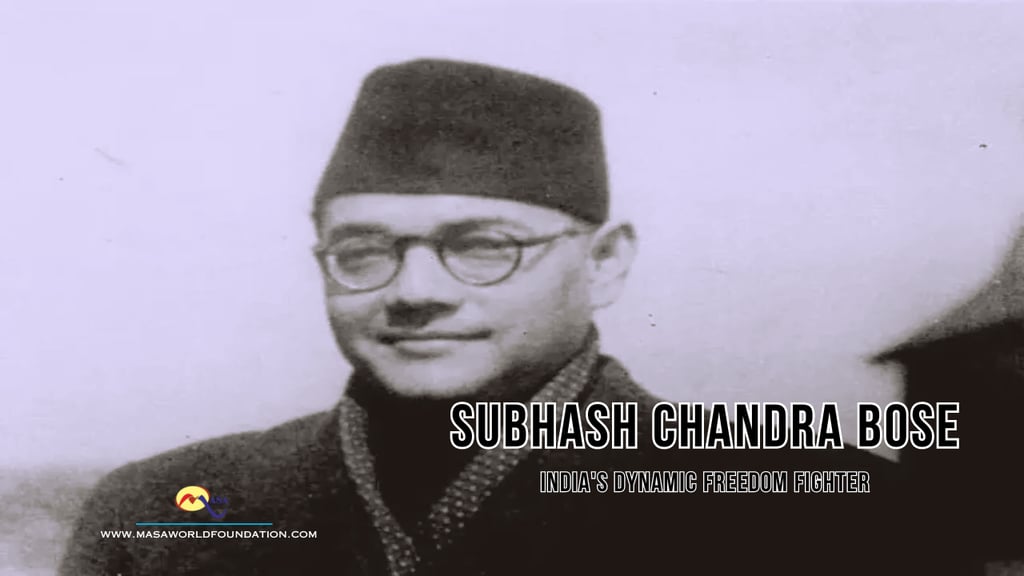Subhash Chandra Bose: India's Dynamic Freedom Fighter
BIOGRAPHYSOCIAL IMPACT
8 min read


Early Life and Education
Subhash Chandra Bose was born on January 23, 1897, in Cuttack, Odisha, to Janakinath Bose and Prabhavati Devi. His father was a prominent lawyer, which allowed Bose to grow up in a household that valued education and discipline. The family environment was intellectually stimulating, fostering a sense of duty and national pride in the young Bose from an early age. He was the ninth child among fourteen siblings, and the camaraderie within his large family played a significant role in shaping his resilient and charismatic personality.
Bose's early education began at the Protestant European School in Cuttack. He was a bright and diligent student, excelling in academics, particularly in subjects like history and philosophy. His inquisitive nature and profound love for his country were evident even during his formative years. This strong academic foundation led him to further his studies at the prestigious Ravenshaw Collegiate School, where he continued to thrive.
In 1913, Bose moved to Calcutta to attend the Presidency College, where he pursued his higher education. However, his stay there was cut short due to his involvement in a protest against a professor who had made derogatory remarks about Indians. This incident marked Bose's first act of defiance against colonial authority, reflecting his burgeoning sense of patriotism and justice.
Determined to complete his education, Bose later joined the Scottish Church College in Calcutta and graduated in 1919. To fulfill his father’s wishes, he traveled to England to prepare for the Indian Civil Services (ICS) examination. Bose's time in England was marked by academic excellence; he secured the fourth rank in the ICS examination in 1920. Despite his success, his inner conflict grew as he felt a deepening obligation towards India's struggle for independence. Ultimately, Bose resigned from the ICS in 1921, choosing to dedicate his life to India’s freedom movement. This decision was a pivotal moment, setting the stage for his future revolutionary endeavors.
Disillusionment with British Rule
Subhash Chandra Bose's journey from a loyal civil servant to a fervent freedom fighter was marked by a deepening disillusionment with British colonial rule. Initially, Bose pursued a conventional path, securing a position in the Indian Civil Services (ICS) in 1920. However, his tenure was short-lived as he grew increasingly frustrated with the systemic injustices perpetuated by the British administration. Bose's discontent was significantly fueled by his exposure to the harsh realities faced by ordinary Indians under colonial oppression.
A pivotal moment in Bose's evolving political consciousness came with the Jallianwala Bagh massacre in 1919, where British troops killed hundreds of unarmed Indian civilians. This atrocity profoundly impacted Bose, reinforcing his belief that the British government had no moral right to rule India. Consequently, he resigned from the ICS, choosing instead to dedicate his life to the struggle for India's independence.
Bose's early political activities were characterized by his association with the Indian National Congress and his close collaboration with prominent leaders such as Chittaranjan Das. However, he soon found himself at odds with the Congress's strategy of seeking gradual reforms through constitutional means. Bose was skeptical of the effectiveness of non-violent resistance and the slow pace of political change. His radical views were further solidified by the Simon Commission's arrival in 1928, which excluded Indian representation and underscored the British disregard for Indian aspirations.
As Bose's frustration with the British and moderate Indian leaders grew, he began advocating for more aggressive measures. His increasing radicalization was evident in his support for complete independence, as opposed to the Dominion status that some Congress leaders favored. This stance led to his eventual departure from mainstream political avenues and the formation of the Forward Bloc in 1939. Through the Forward Bloc, Bose aimed to mobilize a broader base for a more direct and militant campaign against British rule.
Subhash Chandra Bose's disillusionment with British colonialism was a transformative period that laid the foundation for his uncompromising quest for India's freedom. His early political activities and radicalization highlighted his unwavering commitment to achieving immediate and total independence, setting the stage for his subsequent revolutionary endeavors.
Subhash Chandra Bose's association with the Indian National Congress (INC) marked a significant phase in his political journey and India's struggle for independence. Bose's involvement with the INC began in the early 1920s, a period characterized by fervent nationalist activities. He quickly rose within the party ranks, gaining recognition for his passion and unwavering commitment to India's freedom. His charisma and leadership skills did not go unnoticed, leading to his collaboration with prominent leaders like Mahatma Gandhi and Jawaharlal Nehru.
Bose's relationship with Gandhi and Nehru was multifaceted. While he admired Gandhi's dedication and influence, he often found himself at odds with the Mahatma's non-violent approach. Bose believed that a more aggressive stance was necessary to overthrow British rule. Despite these ideological differences, Bose worked closely with Gandhi on several key initiatives, including the Civil Disobedience Movement. His rapport with Nehru was similarly complex, marked by mutual respect but divergent strategies concerning India's liberation.
In 1938, Bose's prominence within the INC peaked when he was elected as the President of the party. His tenure was marked by bold initiatives and a push for more radical approaches to achieve independence. However, his tenure as President was not without contention. Bose's aggressive strategies and his demand for complete and immediate independence clashed with the more moderate and gradualist approach endorsed by other senior INC leaders, including Gandhi.
These ideological clashes culminated in Bose's resignation from the presidency in 1939. His exit from the INC did not signify an end to his political career but rather the beginning of a new chapter. Bose continued to fight for India's independence through alternative means, eventually forming the Forward Bloc and later, the Indian National Army (INA). His legacy within the INC remains a testament to his relentless pursuit of freedom and his willingness to challenge the status quo for the greater good of his nation.
Formation of the Forward Bloc
After his departure from the Indian National Congress (INC), Subhash Chandra Bose's quest for a more militant and radical approach to achieving Indian independence culminated in the formation of the Forward Bloc in 1939. Driven by a vision that transcended the more moderate strategies of the INC, Bose sought to galvanize a broad spectrum of Indian society through this new political entity. The Forward Bloc aimed to unite the left-wing sections of the Congress and other radical elements to create a more formidable force capable of challenging British colonial rule.
Bose's Forward Bloc emphasized direct action and a sense of urgency in the struggle for independence. It advocated for immediate and complete freedom from British rule, rejecting any form of compromise. The objectives of the Forward Bloc included mobilizing youth, workers, peasants, and other marginalized groups, fostering a spirit of nationalism, and preparing for armed resistance if necessary. This approach marked a significant departure from the largely non-violent resistance strategies championed by leaders like Mahatma Gandhi.
The activities of the Forward Bloc included organizing protests, strikes, and rallies to galvanize public support. Bose's charismatic leadership and impassioned speeches drew substantial support from various sections of society, particularly the youth. However, this radical approach also met with considerable opposition. Within the INC, many leaders viewed Bose’s methods as too extreme and potentially divisive. The British authorities, wary of his influence and revolutionary rhetoric, took measures to suppress the movement, including imprisoning Bose and many of his followers.
Despite these challenges, the Forward Bloc left an indelible impact on India’s freedom struggle. It highlighted the growing impatience among Indians with the slow pace of constitutional reforms and the increasing willingness to embrace more confrontational tactics. The Forward Bloc's legacy is a testament to Bose's unwavering commitment to India's independence and his ability to inspire a diverse and dynamic movement. Through the Forward Bloc, Bose not only expanded the scope of the independence movement but also underscored the necessity of a multifaceted approach to achieving freedom.
The Indian National Army (INA) and WWII
One of the most significant chapters in the life of Subhash Chandra Bose is his relentless efforts to establish and lead the Indian National Army (INA) during World War II. Bose’s vision for an armed struggle against British colonial rule led him to seek international alliances, particularly with Axis powers, in a bid to secure India's independence. His journey took him first to Germany in 1941, where he sought the support of Adolf Hitler. Despite limited success in Europe, Bose's persistent endeavors bore fruit when he turned his attention to Japan.
Bose's collaboration with Japanese forces marked a turning point. He arrived in Tokyo in 1943 and was warmly received by the Japanese leadership, who were eager to weaken British influence in Asia. With Japanese assistance, Bose reorganized the INA, which was initially formed by Indian prisoners of war and expatriates in Southeast Asia. He garnered widespread support among the Indian diaspora and managed to create a formidable military force aimed at liberating India from British rule.
The INA, under Bose's leadership, participated in several key operations during WWII. One of the notable campaigns was the Battle of Imphal, where INA troops fought alongside Japanese forces against the British Indian Army. Although the campaign ultimately ended in retreat for the INA, it demonstrated the commitment and bravery of its soldiers. Bose’s strategies for international alliances and military engagements were pivotal in galvanizing support for the Indian independence movement.
However, the eventual defeat of the Axis powers and the subsequent surrender of Japan in 1945 had profound implications for the INA. The army was disbanded, and many of its members were captured and tried by the British authorities. Despite this, the legacy of the INA endured, inspiring a renewed fervor for independence among the Indian populace. The sacrifices and struggles of the INA under Bose’s command remain a testament to his indomitable spirit and his unwavering dedication to India’s freedom.
Legacy and Influence on Modern India
Subhash Chandra Bose, a towering figure in India's struggle for independence, has left an indelible mark on the country's political and social landscape. His contributions to the freedom movement are immeasurable, with his fervent call for complete independence resonating deeply among his contemporaries and future generations alike. Bose's formation of the Indian National Army (INA) and his revolutionary tactics showcased his unwavering commitment to India's liberation from colonial rule, setting him apart as a dynamic and visionary leader.
Bose's vision for a free India was one of inclusivity, economic self-sufficiency, and strong nationalistic fervor. He envisioned an India that was not just politically independent but also socially and economically empowered. His emphasis on industrialization, scientific advancement, and education laid the groundwork for the nation’s progress post-independence. Bose's ideas continue to inspire contemporary political and social thought, particularly his belief in unity and self-reliance, which remain relevant in addressing today’s challenges.
Despite his monumental contributions, Bose's legacy is not without its controversies and mysteries, particularly surrounding his death. The circumstances of his demise in 1945 have been the subject of much speculation and debate. Various theories have emerged over the years, contributing to the enduring fascination with his life story. This intrigue has kept Bose's legacy alive in the public consciousness, prompting ongoing discussions and research into his life and the impact of his actions.
In modern India, Subhash Chandra Bose is revered not only as a freedom fighter but also as a symbol of courage, perseverance, and unyielding patriotism. His life story continues to inspire movements for social justice and national pride. Commemorations of his birth anniversary and other significant events related to his life serve as reminders of his enduring influence. Through his visionary leadership and unwavering dedication, Bose has left a lasting legacy that continues to shape India's journey as a sovereign nation.
